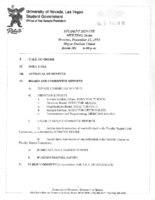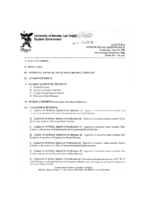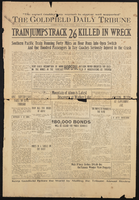Search the Special Collections and Archives Portal
Search Results

Meeting minutes for Consolidated Student Senate University of Nevada, Las Vegas, December 11, 1995
Date
Archival Collection
Description
Text

Meeting minutes for Consolidated Student Senate University of Nevada, Las Vegas, June 19, 1996
Date
Archival Collection
Description
Text

Interview with Herbert Frank York, July 22, 2004
Date
Archival Collection
Description
Text

Interview with Elsie Lavonne Lewis, November 16, 2004
Date
Archival Collection
Description
Text

Meeting minutes for Consolidated Student Senate University of Nevada, Las Vegas, February 2, 1998
Date
Archival Collection
Description
Text

Transcript of interview with Dedee (DaVeen) Nave by Claytee D. White, June 8, 2015
Date
Archival Collection
Description
Dedee (DaVeen) Nave reveals a life filled with distinguished results in the cultural evolution of Las Vegas since her move to the valley in 1971. She was a young bride and soon a mother when she arrived with her can-do energies. She was a trained educator who was eagerly looked outside the classroom for a way to make a difference in the community when she took a position with the Camp Fire Girls Over the following decades, the impact of involving Dedee in many valued projects is evident. In this interview, she provides a glimpse into her various aptitudes and the many people she has worked with to great results. Dedee Nave was born DaVeen Maurer in 1948 in Indianapolis, Indiana, to David and Virginia Maurer and has a sister, Marilyn Maurer MacCollum. Their mother was a convert to Judaism who instilled them with a solid Judeo-Christian foundation. When Dedee became the bride of a mixed marriage, she raised her daughter Alisa in the Jewish faith. Alisa, who is married to Robb Worth, is a practicing attorney in Las Vegas. A graduate of Stephens College in Columbia, Missouri, Dedee studied fine arts, considered being a theater major, modified her plans and became a skilled organizer of people and projects. This ability to envision, implement, and fundraise is seen in Dedee?s distinguished list of community programs, among them her work with: the City of Las Vegas Arts Commission; two terms on the Nevada State Arts Council; a past president of the Junior League of Las Vegas; former chairperson of the Junior League?s Endowment Fund Trustees; Lied Discovery Children?s Museum opening; and chairperson of Morelli House Public Program and many other initiatives.
Text

Transcript of interview with Herb Tobman by Deborah Fischer, March 13, 1981
Date
Archival Collection
Description
Interview with Herb Tobman by Deborah Fischer on March 13, 1981. In this interview on the subject of gambling, Herb Tobman talks about moving to Las Vegas while working for Standard Oil as a tire, battery and accessory salesman, then began working for the Moulin Rouge as the general manager in 1955. He gives a description of the hotels on Las Vegas Boulevard and downtown, and the "western" nature of town where people rode horses. Tobman then discusses the types of gambling that were popular: slot machines, blackjack and craps. He also talks about the accommodations (hotels and motels) available in the 1950s, transportation to and from the area, entertainment, and the economy. The interviewer continually asks Tobman to compare 1950s Las Vegas with 1980s Las Vegas in terms of the gambling environment.
Text

Transcript of interview with Anthony A. Marnell II by Stefani Evans and Claytee White, September 29, 2016
Date
Archival Collection
Description
Twentieth-century visitors to the Las Vegas Sands Hotel experienced the masonry work of Anthony A. Marnell, who removed his family from Riverside, California, to North Las Vegas in 1952 in order to build that structure. When he formed his own masonry company in 1958, he taught his namesake nine-year-old son the skills of a mason and the value of honest work. The younger Marnell learned all he could about construction from his father and completed his education by graduating USC School of Architecture in 1972, serving his apprenticeship, and becoming licensed in 1973. After designing McCarran Airport's A and B Gates, he teamed up with Lud Corrao in 1974 to form Marnell Corrao Associates, the first design-build firm in Southern Nevada. Marnell Corrao built many of Southern Nevada's most iconic hotel-casinos including the California Hotel, Maxim Hotel, and Sam's Town and Steve Wynn and Treasure Island, The Mirage, Bellagio, and New York New York as well as the Rio All-Suite Hotel and Casino and the M Resort Spa Casino. In this interview, the Riverside native speaks to the importance of teaching future generations about the value of work, of earning the sense of accomplishment, and of fueling one's inner spirit. His philosophy built a work environment that encouraged employee longevity from the beginning in 1974 (he is employee number one, and his assistant is employee number two). He talks of the American Institute of Architects (AIA), of entrepreneurial gamesmanship, and of casino greats Bill Boyd, Jay Sarno, Cliff Perlman, Kirk Kerkorian, and Steve Wynn. He describes the evolution of Las Vegas resorts from prioritizing casino games to fine dining to night clubs and entertainment. He credits his own Rio staff tradition of serving Chef's Table to the employees and the Rio's award-winning chef, Jean-Louis Palladin, for beginning the Las Vegas food renaissance in the late 1990s that rebranded Las Vegas as a Mecca for celebrity chefs. The nine-year-old who worked part time in his father's masonry business learned his lessons well, much to the benefit of Southern Nevada's growing skyline, its residents' growing waistlines, and its businesses' growing bottom lines.
Text

José Armando Elique interview, January 14, 2019: transcript
Date
Archival Collection
Description
José Armando Elique was born on February 14, 1944 in New York City. Born to Puerto Rican parents that immigrated to the United States in the 20s, Elique spent his childhood in both New York and Puerto Rico. Raised in the South Bronx, Elique’s family were part of the first pioneros from Puerto Ricans to settle in New York City in the twentieth century. Elique served as a radar man in the United States Navy during the Vietnam War on the USS Purdey. After his service, Elique applied to the Port Authority Police Department where his first big assignment included going undercover and investigating gang activity. Over the course of the next 22 years, he rose through the rankings becoming the assistant chief in charge of overseeing six facilities in the region. Elique is the first and only Latino to reach such rank with the Port Authority. Elique moved to Nevada in 2000 and became the chief of UNLV Police Services. Prior to coming to UNLV, he served as the University Director of Public Safety for the City University of New York (CUNY). Elique is also a member of the National Latino Police Officers Association, an organization that helps train Latino officers on contemporary issues and promote the advancement of Latinos in the police force. As police chief, Elique has fought for the hiring of new police officers to better serve UNLV’s campus and student body. As Chief of Police, Elique oversaw the response of his team to secure the campus and to provide for the needs of those seeking refuge at Thomas and Mack Center on the night of October 1, 2017. Chief Elique is also part of the Remembering 1 October oral history project where he reflected on that night, the role of campus police, coordination with Metro Police, purpose of the Fusion Center, command post, Emergency Operation Center for business continuity, and preparedness of urgent situation and active shooters. He is a graduate of Adelphi University and of Northwestern University’s Traffic Institute of Police Administration and the Police Executive Research Forum’s Senior Management Institute for Police.
Text

